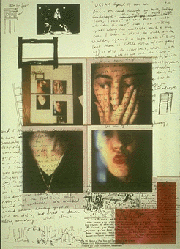|
Primary Course Work
CRITICAL ESSAY (30 pts. or 30% of semester score)
Late in the term you will
complete an essay on one of our assigned authors or readings. This will be
an interpretive piece in which you develop your own thesis and then argue
for that idea in about 5-8 pages. Part of your essay will involve putting
your thesis in a critical context. I.e., you will research other critical
work done on the author or work in question.
BLACKBOARD DISCUSSION BOARD
Reading Journal (40 pts. or 40% of semester score)
Writing is a form of thinking, and it's also a way to assist thinking. Reading journals are a great tool to help you absorb reading material, clarify questions your may have about that material, and even develop your own original insights into the authors we'll be reading.
You will have your own space on Blackboard which will function as your journal. This will be a place for free thinking, questions, and responses to writing prompts I'll be giving you. Click here for complete instructions.
Class Discussion (30 pts. or 30% of semester score)
We will engage in occasional "virtual discussions" via our Blackboard Discussion Board. We will talk back and forth with each other, in other words, using Blackboard threads and replies. Click here for complete instructions.
Final Grading Scale
88-100 points = A
76-87 = B
63-75 =
C
50- 62 = D
Below 50 = F
Note: exceptionally weak or
strong performance on your weekly work will be factored subjectively into
your semester grade, especially in borderline cases.
|
 Housekeeping: Housekeeping:
Policies, Deadlines, & Special
Needs
|
|
Ground Rules
Respect and curiosity are
keywords for this class. It's important that you come with an open mind, a
willingness to test your own views and the views of others, and to think
and feel actively about the readings. It's a discussion and
reading-intensive course, so it's vital that you stay up on reading
assignments and participate energetically. Other
important tips: feel free at any time to argue with me or with your
classmates, and be be ready for interesting, sometimes challenging group
discussions and readings.
Late or Missed Course Work
Critical Essay
This is due no later than midnight on May 14th. Exceptions are
only made with documented evidence of serious harship or illness.
Class Discussion
Each discussion will run from Sunday to Saturday. Entries made after Saturday, midnight, will not be counted.
A Note to English Majors
During their senior year, English majors generally enroll
in the English Capstone course (Engl 467), during which they assemble a
portfolio containing representative written work from NDSU English
courses. The English Department evaluates these portfolios to assess its
undergraduate programs, analyzing how student work meets departmental
outcomes. In order to facilitate the preparation of senior portfolios,
English majors are encouraged to save copies of their written work (in
electronic and hard copy) each semester.
Departmental Outcomes
This course meets at least three English Dept.
outcomes:
- Outcome 1: English majors will be able to write and
speak effectively for a variety of purposes and audiences in a variety
of genres and media.
Outcome 2: English majors will be able to read
(analyze, interpret, critique, evaluate) written and visual texts.
- Outcome 7: English majors will develop
professionalism exhibited in such qualities as self-direction,
cooperation, civility, reliability, and care in editing and presenting
the final product.
University Statement on Academic Honesty
All work in this course must be completed in a manner
consistent with NDSU University Senate Policy, Section 335: Code of
Academic Responsibility and Conduct. http://www.ndsu.nodak.edu/policy/335.htm
Note: any instances of deliberate plagiarism in English
331 will result in an F for the course.
Student Conduct
All interactions in this course including
interactions by email, weblogs, discussion boards,or other online methods
will be civil and students will demonstrate respect for one another.
Student conduct at NDSU is governed by the Code of Student Behavior. See
http://www.ndsu.edu/ndsu/vpsa/code/
for more information.
Americans with Disabilities
Statement
Any students with disabilities or other special
needs who need accommodations in this course are invited to share these
concerns or requests with me as soon as possible. |



 Disclaimer!
Disclaimer!